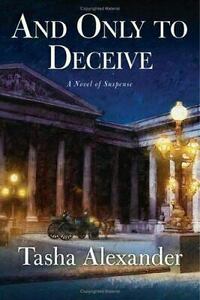You need to sign in or sign up before continuing.
Take a photo of a barcode or cover
lighthearted
mysterious
medium-paced
Loveable characters:
Yes
Diverse cast of characters:
No
This was a fun read. I’d already read the 12th book in the series, which I’d also rated 3 stars. I really only want to keep reading in the series to see Emily and Colin’s relationship develop.
Ejoyable quick mystery read with an amateur Victorian lady sleuth. Shares a great many similiarities in setting and basic character traits with Raybourn's Lady Julia series, but hasn't the depth, richness, or humor of those.
My favorite author, Lauren Willig, has recommended Tasha Alexander's books numerous times on her website. Thus, I assumed And Only to Deceive would be comparable to Willig's Pink Carnation series. Sadly, And Only to Deceive left much to be desired. It was not nearly as witty, sophisticated, complex, or addicting as any of the Pink Carnation series.
This was a surprisingly entertaining read. I enjoyed Alexander's writing style and her choices for her characters. While set in Victorian England, the featured female characters (especially Emily, Cecile and Margaret) do not allow themselves to be constrained by the stuffy societal pressures of the time. But, the characters still manage to come across as realistic for their time period rather than feeling too modern. The writing brought forth the time period rather well I felt, although more for the society rather than the actual physical setting. I loved the incorporation of ancient art and the Iliad in the novel, and the subsequent interest Emily gained for art and language. The mystery, which was a welcome surprise after not having read the summary after being on my TBR for so long, was well-written and fairly convincing as possible in the day.
The romantic element in the book was unnecessary, IMO, but well done. I found Emily's growing fondness for her deceased husband both convincing and rather sad, as she only came to love him after death. One of my only complaints about the novel involves Emily's dead husband, Philip. He was an avid hunter and died in Africa while hunting elephants. As one absolutely against all hunting, I found this irritating and I myself could not come to like or love Philip as Emily did. (This is even moreso the case if you consider the ongoing plight of elephants today, which will possibly be extinct in 10 years due to human cravings for ivory. Yes, their numbers were stronger in the late 19th century but the human greed element was still ultimately present and vile to me.) But Emily did speak against hunting so I hope hunting does not become a theme or recurring element in some way.
The romantic element in the book was unnecessary, IMO, but well done. I found Emily's growing fondness for her deceased husband both convincing and rather sad, as she only came to love him after death. One of my only complaints about the novel involves Emily's dead husband, Philip. He was an avid hunter and died in Africa while hunting elephants. As one absolutely against all hunting, I found this irritating and I myself could not come to like or love Philip as Emily did. (This is even moreso the case if you consider the ongoing plight of elephants today, which will possibly be extinct in 10 years due to human cravings for ivory. Yes, their numbers were stronger in the late 19th century but the human greed element was still ultimately present and vile to me.) But Emily did speak against hunting so I hope hunting does not become a theme or recurring element in some way.
Lady Emily's awakening makes for good reading. How often did this happen in 19th century society? Woman gets independent means and begins to act independently. Katie you would like this one.
BookList: Emily Bromley, a Victorian beauty, doesnt really want to marry, but her mothers persistent pressure forces her to accept wealthy Viscount Philip Ashtons proposal. When Philip dies on safari in Africa a few months after the wedding, Emily feels relief more than grief. Now the wealthy widow of a man she hardly knew, she is free to pursue her hearts real passion--reading! Yet once Emily begins to hear stories about Philips interest in Greek literature and his exquisite collection of antiquities, Emily begins to feel herself falling in love with her mysterious, now-dead husband. But the more she discovers about Philips extraordinary life, the more she fears that his death may not have been an accident. Compounding her concern are some very mixed messages from Philips two best friends and the mounting evidence that he may have engaged in some backdoor business dealings. Who can Emily trust? This engaging, witty mix of Victorian cozy and suspense thriller draws its dramatic spark from the endearingly headstrong heroines growth in life and love. A memorable debut. -- MishaStone (Reviewed 09-01-2005) (Booklist, vol 102, number 1, p67)
Light & clever & fun. Although I figured out who the villain was pretty early on & skimmed through some of the exposition, I liked the self-educating heroine & all the references to Greek antiquity & the idea of a widow discovering things about her husband that make him more interesting when he's gone. Sort of a romance novel in reverse.
I read this a few years ago but am marking it now because goodreads keeps suggesting it. I ALREADY READ IT, GOODREADS. Anyway, I'm pretty sure this involves hemophilia. Or maybe I'm thinking of another Victorian mystery novel. As I said, it's been awhile.



